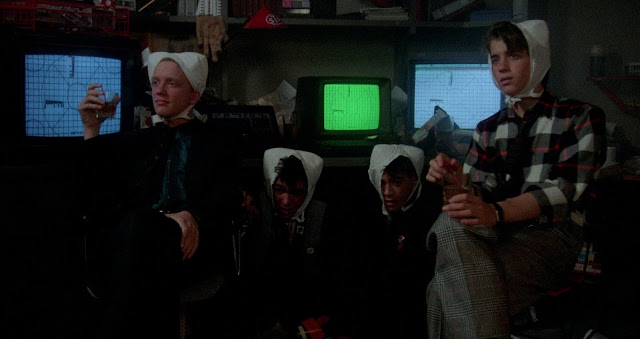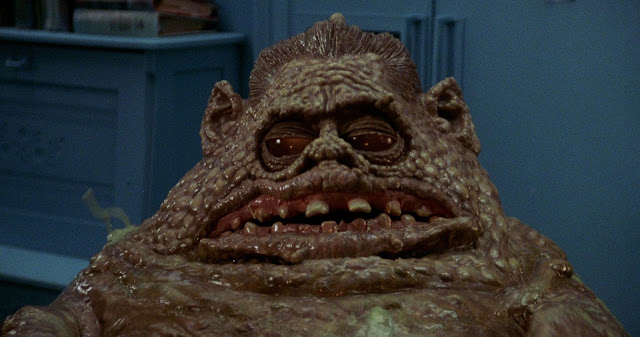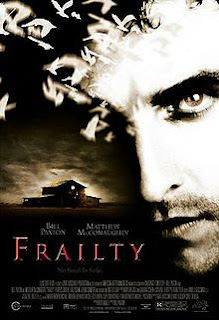Say the name “John Huges” to a film fan and they’ll easily
think of several things: the ‘80s, teens, and love. If ever a filmmaker had
been the face of a movement, it’s Hughes, whose films easily embodied the growing pains
of the middle-America teenager. And that’s what makes Weird Science a semi-outlier in his long and prolific career. Hughes’
most well-known films, The Breakfast
Club and Sixteen Candles, were
comedies at their hearts, but also contained enough emotion, substance, and relatability to register as more than just another 90-minute romp filled with teen
hijinks and gentle kissing. Same goes for Pretty
in Pink, which stops its general lightheartedness and allows for a
genuinely melancholic monologue from Harry Dean Stanton about being an older
and ineffective father.
Weird Science is
base-level John Hughes. It covers all those same components, but in the most
superficial way possible. It is, essentially, Hughes’ take on the teen sex
comedy, which had become prominent by then, ushered in by National Lampoon’s Animal House before things like Porky’s and The Last American Virgin took over. Because of that,
it’s probably not fair to judge Weird
Science in the same way you would judge St. Elmo’s Fire, being that both flicks, despite similar genetic
make-up, have different goals.
Which is what makes Weird
Science kind of a blast, and very, very strange.

High school horndog outcasts Gary (Anthony Michael Hall) and
Wyatt (Ilan Mitchell-Smith) want to get laid. Of course they do; they’re boys in
high school. So, since this slice of Shermer, Illinois, exists in a land before
Tinder, the obvious next step is to create
a girl (using Wyatt’s computer) that will satisfy their carnal urges and teach
them all the different ways of being a sexual maestro. Hughes was right to have
Frankenstein playing on a background
television all during this creation sequence because this is obviously a riff
on that Modern Prometheus. Soon, their creation shows up: a gorgeous British
bird they name Lisa (Kelly LeBrock) who will go on to wreak all kinds
of ‘80s havoc.
A popular term these days is “problematic.” I’m sure you’ve
heard it. It gets thrown around more and more when it comes to judging art from
a different era with 2019 “woke” eyes, a term that, like "hipster" or "socialist," gets conjured a lot by people who don't actually know what it means. Still, bits and pieces from Hughes' catalog haven't aged well in this modern era. Bender looks up Claire’s skirt in The Breakfast Club…without asking. Problematic. In Sixteen Candles, one friend dismissively calls another a “total faggot,” and this unfolds within throwing distance of “Long Duk Dong,” perhaps the most freakishly offensive Asian character not seen since Peter Sellers played Inspector Sidney Wang in Murder by Death. Sixteen Candles: also problematic...along with Murder by Death, I guess. In an
op-ed for the New Yorker, even frequent Hughes MuseTM Molly
Ringwald opined about watching The
Breakfast Club with her modern
eyes and seeing things considered problematic today. “It’s hard for me to
understand how John Hughes was able to write with so much sensitivity, and also
have such a glaring blind spot,” she writes. It’s a good thing she didn’t
appear in Weird Science, as all the fainting couches in the world could not have offered her the support she'd need to reckon with such a triggering past, as it’s basically a poster board for all the ways a comedy could never be made
today.
Yes, Weird Science is a sex comedy, so naturally one should approach it knowing that some of its content is likely to touch hands with the risqué. However, Weird Science ups that content a bit with some of its odder underlying choices, perhaps the least realized but most disturbing aspect being that its lead "heroes," Gary and Wyatt, aged 16 and 15,
respectively, inadvertently create their own personal pedophile by assigning Lisa the age of 23. Naturally, that line of thinking didn’t exist back in the ‘80s, nor did
the implication sink in that because Lisa was created, she hence lacked the ability to consent to the boys' sexual whims, so once it’s made clear she is fully under the boys’ control, it's implied they are basically off-screen raping her
throughout the movie.
Yep, that's how I began this part of the discussion.
Creepy sexual stuff aside, there’s also the scene where
the trio goes to an after-hours blues club with a mixed-race clientele, during which Gary gets so drunk that he begins mimicking the gravelly-voiced African-American man next
to him by giving himself a “black” voice. (The movie comes to a dead halt during
this sequence—not because of the “offensiveness,” but because it’s putting its
full weight on one joke that never works, is generally obnoxious, and goes on
for way too long.) I should note that I don’t personally find any of the above
offensive because I’m an adult and I have the ability to recognize that art
made during certain eras are going to reflect those eras: what was considered
acceptable, what was part of the lexicon, and what, back then, was simply
considered funny. I mean, Moe used to express his frustration with Curly and Larry by beating them mercilessly with pipe wrenches and literally pushing them to the ground. How seriously are we supposed to take comedy, whether slapstick or absurd? When it comes to Weird Science, is the humor ideal? These days, no. Certain things once
normal are now avoided. Should Weird
Science ever get the remake treatment, genders will be swapped, unconsented
sex will be avoided, and everyone will make sure everyone else is on the same page
all the time to avoid any traumatic misunderstandings during the climactic party scene (unless the bad guy does it). Sounds boring.

Weird Science is
often very funny, fully coming alive during the third act where Gary and Wyatt
throw a party that goes very out of control, allowing for cameos from members
of the cast of The Road Warrior
(Vernon Wells) and The Hills Have Eyes
(Michael Berryman). It's during this sequence when Weird Science gets the most outrageous, especially when contents of
the house are sucked out the chimney and redistributed across the back yard
once Gary and Wyatt attempt to create another Lisa-ish compu-girl for two
bullies (Robert Downey Jr. and Robert Rusler) who spent the whole movie
breaking their balls. It’s as if Hughes had spent years writing down every
joke, sight gag, and concept he’d maybe want to use one day and decided that,
during the third act of Weird Science
where anything could happen, he would use it all: frozen grandparents in the
cupboard; an evil older brother, Chet (an amazing Bill Paxton), turning into
some sort of monstrous cryptid; a bedroom where it snows all the time; a rocket ship fucking the interior of Wyatt's bedroom (symbolism!); motorcycle cannibals; and more. Hughes weaves them all together
in a weird, excessive pastiche of chaos that helps usher Weird Science across the finish line, transcending it from an odd but
average comedy to ‘80s cult classic. (That the film is bookended by Oingo
Boingo’s song of the same name helps a lot. What’s more ‘80s than Oingo
Boingo?) (Cocaine.)
Hughes was known for creating the trends along with bucking them—his filmography was the first to treat teenagers as characters with genuine emotions and personalities as opposed to troublemaking archetypes—which is perhaps why Weird
Science, technically a teen-sex comedy, contains no sex whatsoever...at least, not on screen. Despite some brief nudity, courtesy of the skin rags in Wyatt’s bedroom and one amusing sight gag involving a naked pianist—I said pianist!—Weird
Science is visually chaste. The dialogue is certainly racy at times, but there’s
not a single sex scene between any members of the cast, despite that being the reason for Lisa’s
creation—and on top of that, there’s only one implied sex scene throughout the
whole flick. If we follow the movie rule of “if I didn’t see it, it didn’t happen,”
then Gary and Lisa never have sex at all, and if they did, you'd think the boys would compare notes about their first sexual dalliance in that soft, eye-opening way Hughes often employed when writing about the teenage experience. This would make sense in an ironic way
if the flick had followed that concept for both boys—they created their own sex
goddess, but never actually had sex with her—but instead, it seems Wyatt’s the
only one who gets laid. It’s weird.
♫ Weird Science! ♫

The more one thinks about Weird Science, the less sense it all makes, so maybe we shouldn’t dive too deep into the implications of its main characters,
but come on: Gary and Wyatt are dicks. They do awful things, learn zero
lessons, and still get the girls
(Suzanne Snyder, my ‘80s crush I’m still sweet on and who appeared on Seinfeld as two different characters—it's true!—and Friday the 13th: The Final Chapter's Judie Aronson), who they
both profess to love within 24 hours of interacting with them for the first time. And how do they “get”
the girls? By shooing away some mutant bikers before very recklessly firing off a gun by accident in Wyatt's house for comedic effect. Sure, saved lives can make a
solid case for new infatuation, but if I wanted to poop this party, I could say the girls' infatuation comes about as byproducts of their mutant traumatic experiences, a twisted transference of Stockholm Syndrome. And let's also remember that our guys "get" those girls after having agreed to create another Lisa for those earlier mentioned bullies in the most casual agreement regarding human trafficking since the nearest Q follower's imagination. And when Wyatt drops off Hilly at her house the next morning, where she tells him she’ll probably be
grounded for a month, Wyatt says that he’ll wait for her…before grabbing her
ass with both hands with his
fingers crossed. What the fuck, what does that mean? He’s not going to wait for her? Did he learn nothing? Does he feel nothing? God, fuck you, Wyatt. DON’T YOU DARE
DISRESPECT JUDIE ARONSON—SHE WAS AMERICAN NINJA'S GIRLFRIEND.
And what about poor Lisa, the victim in all this? How does a person come to grips
with the existential realization that she’s been created out of thin air solely
to be used as a sex toy? That she never had a childhood during which she could forge the experiences that help us all grow into the adults we become? And does that make it weird for her once the sex stuff
falls by the wayside and she instead starts mommying the boys with a whole bunch of life
lessons? Is she the wisest 23-year-old in existence? How does she get that gym teacher job at the end if she
doesn’t have a social security number? Does she have DNA?
Can she procreate? How long does a computer-generated person live, anyway? Do she and the boys all stay friends for the rest of their lives? Would it be weird if
they did, or weird if they didn’t? When Gary and Wyatt eventually marry
their girlfriends and Lisa goes to their joint wedding, do the
boys reintroduce her to their new wives by saying, “Remember Lisa, the fuck slave we
created with Wyatt’s Macintosh?”
♫ Weird Science! ♫

You might be tempted to think that because I've taken the time to explore the non-ageless content of Weird Science that I'm denigrating it in some manner, but I'm not. I'm celebrating Weird Science's oddness, it's strange surreal take on the somewhat boring teen-sex-comedy sub-genre, and yeah, it's political incorrectness. It's that last part that's being sucked out of the comedy genre, leaving it a soulless husk. A future in which people from all walks of life can walk out of a movie all having laughed at all the same jokes without feeling challenged in any particular way by its a content is a future that sounds bland and joyless. Comedy is the last line of defense where offense can be explored and prodded in ways that produce laughter both conflicted and joyful. Without that line to straddle, there's no Blazing Saddles, there's no Trading Places, and there's sure as hell no Weird Science.














